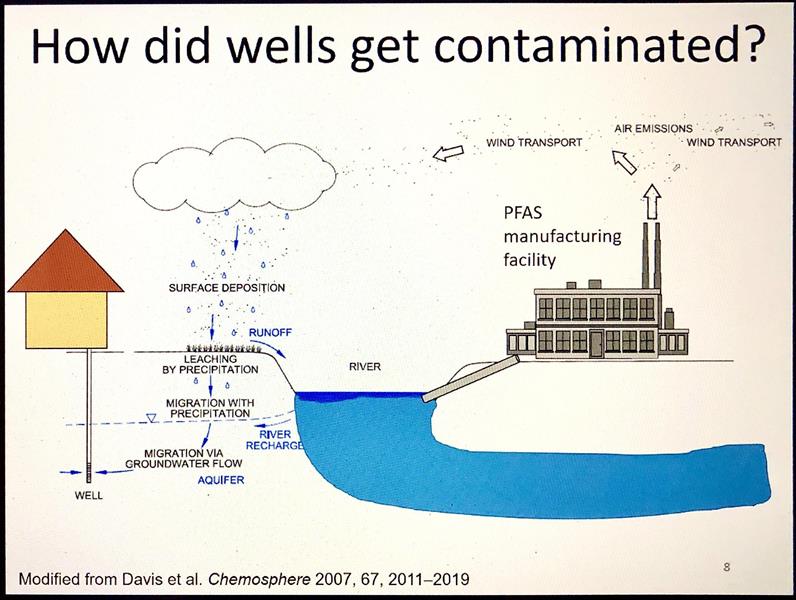
This image, from a presentation about the GenX chemicals, describes how GenX and similar chemicals (collectively known as PFAS chemicals) got into people’s drinking water wells. It was shown Saturday during an online forum, where scientists discussed how much GenX and other chemicals they found in wells near the Chemours factory south of Fayetteville. [Photo of computer screen]
Study: GenX chemical in 70 of 84 wells tested near Chemours’ Fayetteville Works plant
NORTH CAROLINA — Researchers from N.C. State University tested 84 wells and water from 85 homes in Cumberland and Bladen counties near the Chemours chemical factory south of Fayetteville and found the GenX chemical in 70 of them, they said during a public forum Saturday.
Of these, 33 wells had GenX concentrations of more than 140 parts per trillion, said scientist Nadine Kotlarz of the university’s GenX Exposure Study. The North Carolina Department of Health and Human Services says people should avoid water with more than this amount in it.
“At this level or lower, no human health effects are expected in the most sensitive people over a lifetime of exposure,” says a slide shown in Saturday’s forum.
The findings of the GenX Exposure Study were presented to the public in an online video conference which organizers said had nearly 110 people.
GenX is a PFAS (PFAS stands for “perfluoroalkyl substance” and “polyfluoroalkyl substance”) that the Chemours Co.’s Fayetteville Works plant discharged into the air and the Cape Fear River for many years. The chemical was not regulated at the time.
The study found other kinds of PFAS chemicals, Kotlarz said, “and wells with higher GenX tended to have higher levels of the other PFAS.”
The Environmental Protection Agency says animal research has found PFAS chemicals have caused tumors and other health problems in animal studies.
State regulators took action in summer 2017 after the StarNews in Wilmington reported that GenX from the Cape Fear River was getting drinking water supplies in the Wilmington area.
Later research found GenX in wells in the area around the factory, which is off N.C. 87 about 15 miles outside Fayetteville. Chemours has been supplying bottled water and water filtration systems to some homes in that area.
Rain brings airborne GenX to the ground, where it seeps with the rainwater down into people’s well-water, a slide from the forum says. Wells can also get GenX from contaminated river water that seeps through the ground from the river bottom, it says.
So far, an estimated 3,000 private wells have been affected by the emissions from the Chemours plant, Kotlarz said.
NC State’s GenX Exposure Study testing wasn’t a random sampling, Kotlarz said, because it only looked at wells previously sampled by Chemours or the North Carolina Department of Environmental Quality.
“So it’s important to realize that our well data tells us about our study participants’ wells. It may not be representative of all of the contaminated wells surrounding Fayetteville Works,” she said.
The samples for this study were taken in February 2019, which is after Chemours ended its intentional discharge of GenX into the Cape Fear River and before it installed $100 million of equipment to stop GenX from being emitted into the air.
GenX from Chemours’ property continues to leach into the river, and the company is installing a system to try to stop that.
Other information from Saturday’s forum:
‒ Homes with filtration systems had less GenX in their tapwater than in their wells.
‒ Studies are underway to see how GenX and other PFAS chemicals affect fruits and vegetables grown with contaminated water. The research is difficult to do, researcher Detlef Knappe, said.
‒ The researchers took blood and urine samples from residents who live near the Chemours plant to see how much GenX they have in their bodies. The results have been delayed because the testing labs have been unavailable because of the COVID-19 pandemic, said Jane Hoppin, the principal investigator in the study.
-END-
